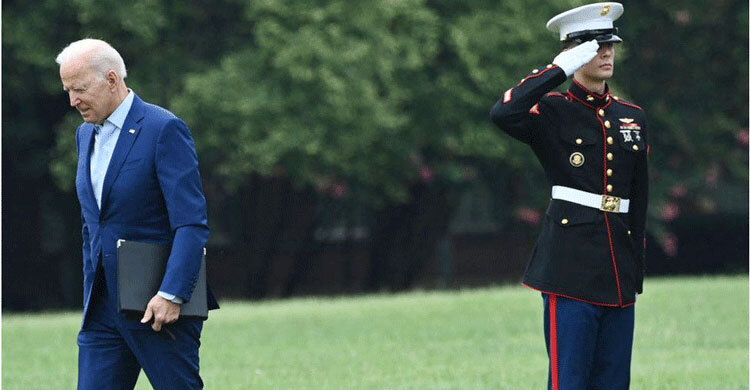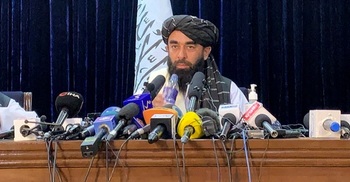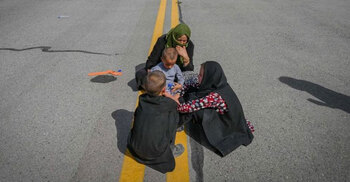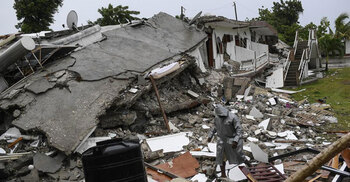Three ways this Afghanistan crisis really hurts Biden

Jon Sopel
North America editor, BBC
There's a quote in To Kill A Mockingbird where Jem is told by Miss Maudie that "things are never as bad as they seem." For Joe Biden, right now, things do look pretty dark.
But if I'm digging into my quotations book, who can better Kipling's If - and that line about treating triumph and failure as the impostors that they are? Politicians have been told down the ages that there is no coming back from this or that catastrophe, and - yet - back they come.
The shambolic unravelling of America's withdrawal from Afghanistan comes from a yet to be written textbook of "how to lose at everything". Warnings hadn't been heeded, intelligence was clearly totally inadequate, planning was lamentable, execution woeful.
Let's just focus in on one thing - although there are any number that are worthy of examination.
The withdrawal came during the "fighting season" - a phrase I have to say I have always found rather odd. But in Afghanistan there is a fighting season which starts in spring - and then in winter, when the country freezes over, there is a time when the Taliban go home to their tribal homelands. Did no-one think that it might have been better to have ordered the withdrawal for the dead of winter when Taliban forces weren't there, poised to fill the vacuum?
The end result might have been the same - a Taliban takeover - but it would have almost certainly led to a more orderly drawdown. Yet the Biden administration wanted an eye-catching date. They wanted the withdrawal completed by 11 September. Twenty years on from 9/11 - an artificial, self-imposed deadline.
One more quote. After the catastrophic Bay of Pigs invasion, when Cuban emigres backed by the CIA tried to overthrow Fidel Castro, John F Kennedy - the president at the time of that debacle - noted sorrowfully that victory has a hundred fathers, but failure is an orphan.
Joe Biden is an orphan right now. And that could have consequences for his presidency; and far more importantly how the rest of the world sees America.
Biden's election campaign could be boiled down to three messages to distinguish himself from Donald Trump. First, he would be more empathetic. He would be more competent. And instead of "America First", it would be replaced by the mantra "America is back".
But in his address yesterday, there wasn't a whole lot of empathy towards the thousands of Afghans who've helped Americans these past 20 years. On competence, even his biggest cheerleaders would struggle to say the withdrawal of American troops has been anything other than shambolic.
And after the bewildering events of the past few days, how exactly is America back? Many see what has unfolded on President Biden's watch in Afghanistan as a linear continuation of Donald Trump's America First policies - and, as some have joked cruelly, not as well organised.
That is potentially deeply damaging.
But on the policy itself, Joe Biden is utterly defiant. He summoned up his inner Harry Truman and made clear in his speech that the buck stops with him. He was, however, happy to distribute blame in much the same way that a muck spreader disperses manure in all directions. The Afghan leadership weren't up to it, the Afghan armed forces had no fight in them; Donald Trump had negotiated a bad deal.
There can be an endearing chirpiness to Joe Biden, but there's also a chippiness. He doesn't like being questioned, and on many foreign policy questions he is convinced of his own rightness.
Joe Biden has never been a "liberal interventionist", thinking that liberal democracy is something that can be shipped out of Baltimore Harbour in 40ft containers and exported around the world. He thinks the US military should only be overseas to defend vital US interests. And with al-Qaeda largely beaten, Osama Bin Laden dead, it was job done. Time to come home.
That is a view, I should add, shared by millions of Americans. But approving of the policy is very different from the dysfunctional implementation. And what if terror groups, feeling emboldened by the Taliban victory, decide to launch their own attacks on Americans abroad - or Americans at home? Then it could be politically catastrophic.
Which brings us to how Western leaders see America now. A fascinating nugget from a briefing that's just been given by Joe Biden's National Security Adviser. Since the fall of Kabul, Jake Sullivan revealed, Biden hadn't spoken to another world leader. Wasn't that just a bit surprising, given that there were a lot of other nations - including Britain - who'd committed vast resources to Afghanistan? Following Sullivan's briefing, the White House announced that Biden had spoken with UK Prime Minister Boris Johnson.
When the G7 gathered in Cornwall and the Nato nations met in Brussels the sense of relief was palpable among the prime ministers and presidents that a more outward looking American president was in charge. But given what has unfolded - how America has been humiliated, how Joe Biden embarked on a policy he was cautioned against by these leaders - there is now a good deal more wariness.
And who will feel they have gained most from America's departure - apart from the Taliban, of course? Why, three countries that neighbour Afghanistan - Russia, Iran and China. I'm not sure that is what Joe Biden had in mind when he said after his inauguration that "America is back".







